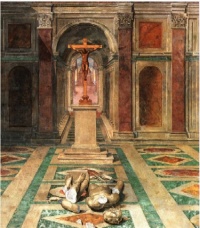Christ
From The Art and Popular Culture Encyclopedia
| Revision as of 20:56, 12 November 2011 Jahsonic (Talk | contribs) ← Previous diff |
Revision as of 15:43, 15 October 2012 Jahsonic (Talk | contribs) Next diff → |
||
| Line 6: | Line 6: | ||
| [[Image:Christ aux Outrages ( 1889) by Henry de Groux.JPG|thumb|right|200px|''[[Christ aux Outrages]]'' ([[1889]]) by [[Henry de Groux]]]] | [[Image:Christ aux Outrages ( 1889) by Henry de Groux.JPG|thumb|right|200px|''[[Christ aux Outrages]]'' ([[1889]]) by [[Henry de Groux]]]] | ||
| {{Template}} | {{Template}} | ||
| - | # In [[Judaism]] The ‘Lord's anointed one’ or messiah predicted in Jewish prophecy. | + | |
| - | #: ''For there shall arise false '''Christs''', and false prophets, and shall shew great signs and wonders; insomuch that, if it were possible, they shall deceive the very elect.'' (Matthew 24:24) | + | '''Christ''' ([[ancient Greek]], ''Christós'', meaning '[[anointing|anointed]]') is a translation of the Hebrew מָשִׁיחַ (Māšîaḥ), the [[Messiah]], and is used as [[Names and titles of Jesus in the New Testament#Christ|a title]] for [[Jesus]] in the [[New Testament]]. |
| - | # In [[Christianity]] The title given to [[Jesus]] of Nazareth, seen as fulfilling messianic prophecy; often treated as a personal name. | + | |
| + | The followers of Jesus became known as [[Christian]]s (as in [[Acts of the Apostles|Acts]] 11:26 because they believed Jesus to be the Messiah (''Christos'') [[prophecy|prophesied]] in the [[Hebrew Bible]]. Christians designate him Jesus Christ, meaning Jesus ''the Christos''. Christ was originally a title, but later became part of the name "Jesus Christ", though it is still also used as a title, in the reciprocal use ''Christ Jesus'', meaning ''"The Messiah Jesus"''. In common usage "Christ" is generally treated as synonymous with "Jesus of Nazareth". | ||
| + | |||
| + | Jesus is not accepted by the majority of [[Jews]] as [[Jewish Messiah|their Messiah]]. The Jewish people still await the Messiah's first coming, while Christians await his [[Second Coming of Christ|second coming]], when they believe he will fulfill those parts of [[Messianic prophecy]] left unfulfilled in the first century AD. | ||
| + | |||
| + | The area of [[Christian theology]] called [[Christology]] is primarily concerned with the nature and person of [[Jesus Christ]] as recorded in the Canonical gospels and the letters of the [[New Testament]]. | ||
| + | |||
| + | |||
| == See also == | == See also == | ||
| * [[Anointing of Jesus]] | * [[Anointing of Jesus]] | ||
Revision as of 15:43, 15 October 2012

|
Related e |
|
Featured: |
Christ (ancient Greek, Christós, meaning 'anointed') is a translation of the Hebrew מָשִׁיחַ (Māšîaḥ), the Messiah, and is used as a title for Jesus in the New Testament.
The followers of Jesus became known as Christians (as in Acts 11:26 because they believed Jesus to be the Messiah (Christos) prophesied in the Hebrew Bible. Christians designate him Jesus Christ, meaning Jesus the Christos. Christ was originally a title, but later became part of the name "Jesus Christ", though it is still also used as a title, in the reciprocal use Christ Jesus, meaning "The Messiah Jesus". In common usage "Christ" is generally treated as synonymous with "Jesus of Nazareth".
Jesus is not accepted by the majority of Jews as their Messiah. The Jewish people still await the Messiah's first coming, while Christians await his second coming, when they believe he will fulfill those parts of Messianic prophecy left unfulfilled in the first century AD.
The area of Christian theology called Christology is primarily concerned with the nature and person of Jesus Christ as recorded in the Canonical gospels and the letters of the New Testament.
See also
- Anointing of Jesus
- Anointing
- Anti-Christ
- Chrism
- Christ in art
- Christianity
- Christology
- Jewish Messiah
- Messiah
- Messianic prophecy
- Names and titles of Jesus in the New Testament



_by_Henry_de_Groux.JPG)

